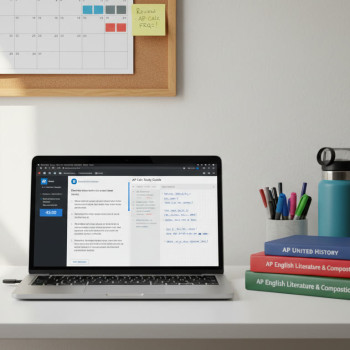Why this Matters: AP Exams, LMU Munich, and the German University Landscape
Thinking about studying at LMU Munich or another public university in Germany? You’re not alone. Students across the U.S. and worldwide are increasingly blending College Board Advanced Placement (AP) coursework with targeted preparation for German university entrance requirements. The good news: AP classes and scores can be powerful assets — if you know how to use them alongside German-specific pathways like the Feststellungsprüfung (FSP).
Who should read this?
If you’re a high school student dreaming of Munich, a parent helping plan the path, or a counselor advising international applicants, this guide walks you through the practical intersection of AP exams and the German university system. It’s conversational, realistic, and focused on actionable steps — including study strategies, timelines, and how personalized tutoring (like Sparkl’s 1-on-1 guidance) can fit into your plan.

Quick Overview: Two Parallel Paths to German Universities
There are two common routes international students follow to enroll in a German public university such as LMU Munich:
- Direct recognition of secondary credentials (sometimes with supplementary documentation or exams), and
- The Foundation or Assessment Path — the Feststellungsprüfung (FSP) after one year at a Studienkolleg (foundation/bridging college).
Where do AP exams fit? AP courses and high AP scores can strengthen your academic profile, provide evidence of subject mastery, and in some cases substitute for specific subject requirements — but they rarely replace the administrative steps of the FSP route if German rules require it. Think of APs as a currency that enhances your application and, in some cases, can reduce the number of bridging requirements.
AP Scores: What They Demonstrate
AP exams are internationally recognized measures of college-level knowledge in high-school settings. A strong AP record demonstrates:
- Subject mastery in areas like Calculus, Biology, Physics, History, and Language.
- Academic rigor — admissions offices in Germany value students who challenge themselves.
- Potential for credit recognition — some German universities or programs may grant course exemptions or credit for high AP scores, depending on the subject and score thresholds.
Feststellungsprüfung (FSP): The Core German Route Explained
The Feststellungsprüfung is an assessment typically taken after completing a Studienkolleg program in Germany. It determines whether your qualifications sufficiently prepare you for the subject-specific demands of German undergraduate study. Key points:
- Studienkolleg is often a one-year preparatory program with subject-specific tracks (e.g., T-course for technical subjects, M-course for medical/natural sciences, and W-course for business).
- The FSP tests language ability, subject knowledge, and academic readiness for your intended field.
- Passing the FSP grants eligibility to apply to a German university for comparable degree programs.
Importantly, AP exams can sometimes shorten the academic gap because high-level AP scores show subject competence and may reduce the burden of content-focused portions of the Studienkolleg/FSP process — but the exact recognition rules vary by state and university.
How AP Helps Before and During Studienkolleg
Here are realistic ways APs can help if you plan to take the Studienkolleg + FSP route:
- Placement advantage: Strong AP results (5s and high 4s) in relevant subjects may be used to demonstrate prior knowledge when applying or during placement discussions.
- Study efficiency: If you’ve mastered Calculus AB/BC or AP Physics, you’ll need less catch-up in technical Studienkolleg modules.
- Reduced retake risk: Better background knowledge increases your chances of passing the FSP on the first attempt.
Practical Steps: From AP Classroom to LMU Munich Application
Here’s a step-by-step playbook you can follow — adaptable whether you’re a rising junior or wrapping up your final year.
1) Early planning (Junior year or earlier)
- Map subject choices: Align AP subjects with intended major in Germany (e.g., AP Calculus + AP Physics for engineering; AP Biology + AP Chemistry for life sciences).
- Speak with counselors: Confirm how AP credits are typically treated by target German universities and if the intended program has special requirements.
- Improve German language exposure early — most programs require strong German for German-taught degrees. Start classes, language apps, or immersion activities as soon as possible.
2) Senior year and test timing
- Select AP exams strategically — choose the exams that most closely match the knowledge base of your future Studienkolleg track or degree program.
- Register early and balance your test load so you can maintain grades and extracurriculars.
- Plan for German language exams (TestDaF, DSH, or equivalent) if you intend to apply directly to German-taught programs — or plan to reach required German levels before or during Studienkolleg.
3) Applying to Studienkolleg or seeking direct recognition
Some applicants will be eligible for direct recognition (depending on their high school diploma and AP profile), while others will apply to Studienkolleg. In both cases:
- Compile strong documentation: your high school transcript, AP score report, and any standardized English results if relevant.
- Highlight AP scores: present them clearly as evidence of readiness for subject-specific coursework.
- Prepare for entrance or assessment exams for Studienkolleg, which often test subject knowledge and German.
Content Table: Typical AP Subjects and How They Align With German Studienkolleg Tracks
| Studienkolleg Track | Relevant AP Subjects | Why It Helps |
|---|---|---|
| T (Technical / Engineering) | AP Calculus AB/BC, AP Physics 1/2/C | Strong quantitative foundation, calculus, and mechanics knowledge accelerates math and physics modules. |
| M (Medicine / Natural Sciences) | AP Biology, AP Chemistry, AP Calculus | Solid grounding in lab sciences and math reduces content gaps for biology/chemistry coursework. |
| W (Economics / Business) | AP Microeconomics, AP Macroeconomics, AP Statistics | Introduces economic principles and quantitative reasoning useful for business modules. |
| G (Humanities / Social Sciences) | AP English Language, AP English Literature, AP History | Develops analytical reading and writing skills for humanities-heavy curricula. |
Study Strategies: Combining AP Prep and German-Specific Readiness
Balancing AP exam prep with the specific demands of German applications requires a targeted approach. Here’s a strategy you can actually use:
1) Build a subject-priority calendar
List the AP exams you’ll take and rank them by their relevance to your intended Studienkolleg track and university major. Allocate study time weighted by relevance — more for high-impact subjects.
2) Integrate language study daily
German competence is often the gating factor. Short daily practice beats infrequent marathon sessions. Use combination methods: tutor sessions, Duolingo or similar apps for vocabulary, and German media (podcasts, news, films) for listening comprehension.
3) Active practice over passive reading
For AP content, mix problem-solving and past exam questions with concept review. For German academic readiness, practice writing structured essays and technical summaries in German — these two exercises build clarity and discipline across languages.
4) Mock exams and reflection
Simulate test conditions for both AP exams and any Studienkolleg entrance tests. After each mock, write a focused reflection: Which topics were weakest? How will your next two weeks of study change? This habit accelerates improvement.
How Personalized Tutoring (Like Sparkl) Fits Naturally
Personalized tutoring can be a game-changer when you’re juggling APs and German university requirements. Here’s how targeted 1-on-1 guidance helps:
- Tailored study plans that prioritize AP topics most relevant to your German track (e.g., focusing AP Calculus topics that overlap with Studienkolleg math modules).
- Subject-matter expert tutors who can explain tricky concepts in multiple ways until they click — especially helpful for students facing advanced STEM AP exams.
- Language coaching that pairs German grammar practice with academic writing feedback — an efficient way to improve both German and English academic skills.
- AI-driven insights (if offered) that analyze practice performance and suggest high-impact study adjustments so every hour counts.
When it fits the budget, a few months of focused, personalized tutoring before key AP exams or during Studienkolleg application windows can substantially raise both your confidence and your results.
Real-World Examples and Scenarios
Here are three common student stories (composite, anonymized) illustrating different approaches.
Scenario A: Direct Recognition Candidate
Maria finished high school with strong grades and AP exams in Calculus BC (score 5) and Physics C (score 4). She applied to LMU Munich’s technical program and coordinated with admissions staff to show her AP profile. The university evaluated her records for subject equivalency and recommended she submit additional documentation. Her AP scores strengthened her application and, in some modules, allowed her to skip introductory coursework.
Scenario B: Studienkolleg + FSP Route
James had AP Biology and AP Chemistry scores but his diploma didn’t meet direct-admission criteria. He enrolled in a Studienkolleg M-track. Because of his strong AP background, he focused his Studienkolleg year on German academic language and targeted subject gaps. He passed the FSP on the first attempt and entered his degree program without delay.
Scenario C: Hybrid Approach
Layla aimed for a humanities degree. She took AP English Language and AP European History, achieving high scores. She also worked intensely on German and took a short preparatory course. Her AP essays served as excellent writing samples and the combination of AP subject mastery plus language readiness helped her get an early offer.
Common Questions Families Ask
- Will AP scores guarantee acceptance to LMU Munich? No single credential guarantees admission. AP scores strengthen applications and can be used for credit or placement, but admission hinges on the full dossier and the university’s rules.
- Do I need the Feststellungsprüfung if I have many APs? Possibly. The requirement depends on your high school diploma’s equivalence. Strong APs can reduce content gaps but may not replace the formal FSP requirement.
- Which language test is required? For German-taught programs you’ll typically need a recognized German language certificate (TestDaF, DSH, or equivalent) unless applying to an international English-taught program. Check the specific program’s requirements early.
Timeline Checklist — A Practical Calendar
| When | Action |
|---|---|
| 2+ years before | Choose AP subjects aligned to intended major; begin German language exposure. |
| 1–2 years before | Take AP courses; secure strong transcripts; research LMU and Studienkolleg requirements. |
| Year of graduation | Take AP exams; take German language tests as needed; apply for Studienkolleg or direct recognition. |
| After graduation | Complete Studienkolleg and FSP if required; apply to universities; prepare for enrollment logistics. |
Practical Tips for Parents and Supporters
Your role is huge and multifaceted. Here’s how to be helpful without overwhelming:
- Encourage planning conversations early — especially about course selection and language learning.
- Support a balanced schedule so AP prep doesn’t crowd out rest and mental health.
- Help manage logistics: transcripts, AP score reporting, and communications with admissions offices can quickly become administrative tasks that burden students.
- Consider structured tutoring or advisory help during critical windows. Personalized options like Sparkl can provide focused academic coaching and planning support tailored to the AP-to-Germany pathway.
Pitfalls to Avoid
- Assuming APs alone will handle German-specific admissions requirements — always verify the university’s rules early.
- Neglecting German language development — for many programs, language ability is non-negotiable.
- Taking too many tests at once — burnout is real. Prioritize quality over quantity.
- Waiting until the last minute to translate or authenticate documents for German authorities — start early, because bureaucratic processing can take weeks.
Final Thoughts: A Balanced, Strategic Approach Wins
Pursuing LMU Munich or any German public university is an exciting, achievable goal when you combine the rigor of AP courses with thoughtful planning for German-specific processes like the Feststellungsprüfung. AP exams are valuable proof of academic readiness; Studienkolleg and the FSP are formal gateways that evaluate compatibility with German higher education standards. Use both to your advantage.
Make a clear plan, prioritize language learning, choose AP subjects strategically, and consider targeted 1-on-1 support where it matters most. Personalized tutoring can sharpen weak points, help you build a tailored study calendar, and provide confidence during transitions — a practical investment in a high-stakes process.

Next Steps
Start with a simple checklist: pick your AP subjects, set a German learning goal, and map out a two-year timeline. Talk to your school counselor and, if helpful, schedule a consultation with a personalized tutor to craft a study plan that aligns AP strengths with German university requirements. Small, consistent steps now will make the path to Munich or any German campus feel much clearer — and far more attainable.
Wishing you clarity, steady progress, and the confidence to make the bold move toward studying in Germany. If you’d like, I can help you draft an individualized study timeline or a sample two-year plan that aligns your AP schedule and German language milestones with Studienkolleg/FSP timing.

















No Comments
Leave a comment Cancel